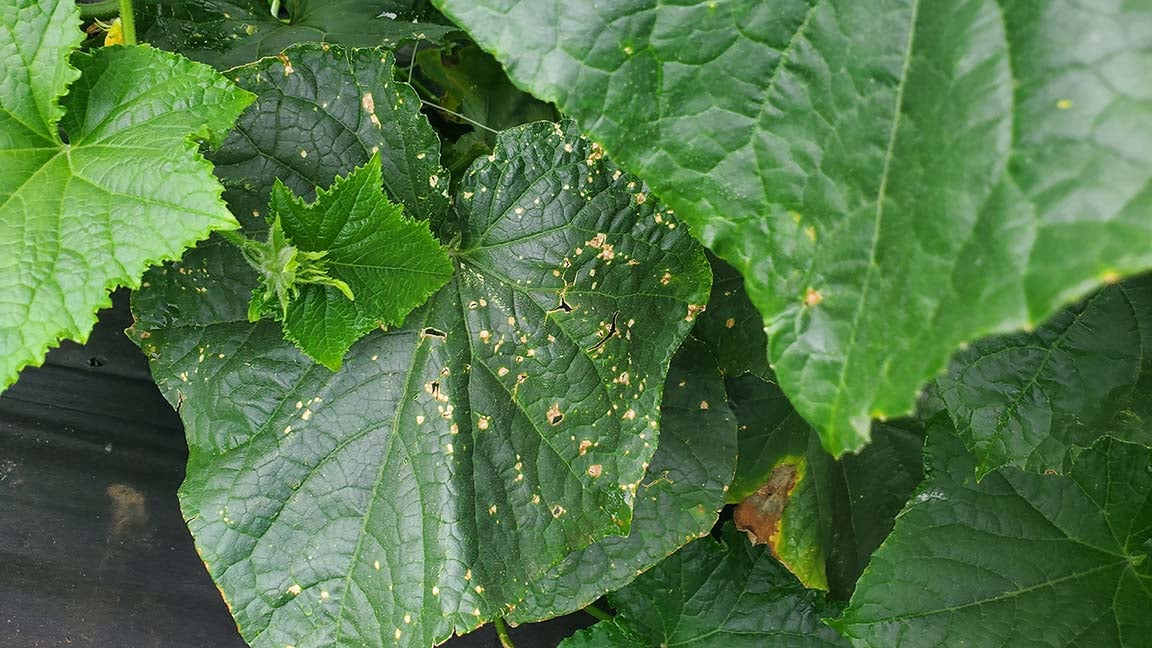Ready resource
Kristen Curry
This summer’s dry conditions are leading many of us to look nervously out the window at our stressed-out shrubs, and perhaps even the plants found inside our home. Rest assured, care and advice from the University of Rhode Island’s Plant Protection Clinic is only a mail drop or email away.
A tidy white building at the bottom of the University’s Kingston Campus, formerly the site of URI’s turf program, is where the plant Rx takes place. Recently renovated, a variety of work takes place under its low roof, from processing vegetables grown on the University’s nearby agronomy farm to classes for local farmers.
Inside, Heather Faubert and Keiddy Urrea-Morawicki are ready to answer your plant questions.
Faubert, who began working at URI in 1981, brings a wealth of experience. Her focus has varied over the years, including working with local apple orchards and potato farmers. Urrea-Morawicki is a plant pathologist who started at the University earlier this year, bringing five years of experience on plant disease diagnostics at the Plant Health Clinic at the University of Arkansas. This fall, they will be joined by new Cooperative Extension agent David Weisberger.
Plant Rx
Faubert was a plant sciences major at URI and fell in love with plant protection when she took a class in that subject. “I really liked looking at the things that attack plants,” she said, “diseases, insects.”
Faubert runs the clinic just as you’d run any kind of a clinic … plant owners reach out to her, she takes samples and diagnoses problems, makes suggestions and offers remedies. Today, much of the diagnosis happens via email; think tele-plant health. The clinic processes about 400 samples a year.
At the door to the clinic, a collection box sits outside for farmers and landscapers to drop off plant specimens for examination. If anyone can’t figure out an issue seen on their plants, they have the Plant Clinic’s extensive knowledge to depend on.
These plant consultants share expertise in a number of ways, hosting Cooperative Extension and leading a “Pest Walk” in a community garden in Providence for the Northern Conservation District. Faubert even recently visited the state prison in Cranston with the nonprofit Garden Time to examine the gardens there and offer advice on keeping their gardens disease and pest free. The URI team has a pretty good success rate for plant diagnosis, solving over 95% of their cases.
For plant owners, there is a charge for the service – $10 per sample, which goes to cover clinic books, travel, lab equipment and supplies.
Facing challenges
The Plant Protection Clinic relies on a strong network of environmental partners within the state and outside the state. The National Plant Diagnostic Network gained momentum after 9/11, when the clinic’s work came under the auspices of Homeland Security with concerns about bioterrorism. Such clinics, found at every land grant institution, are on the front line in diagnosing pathogens. The Plant Clinic also is part of a network of local organizations and individuals who readily share knowledge and resources. “That’s a virtue of Rhode Island being so small,” Faubert said. “It’s one of our greatest strengths.”
With her time in the clinic, Faubert has been a firsthand witness to the impact of climate change. One notable trend is that insects are breeding more generations in shorter time spans and severe weather, often wet and warm, can breed more disease. Insects that would not overwinter in New England in the past are now here year round. Regions have expanded, too. The Southern pine beetle, for instance, used to be found only in the South – but now is found in Rhode Island.
Faubert is currently focused on beech leaf disease, which first made its presence known in Rhode Island in 2020. Within a year’s time, virtually all of the beech trees in Rhode Island, both American and English, were affected with a tiny, foliar nematode, including those at URI. Though a cure is not yet known, the research is catching up and Faubert is hopeful about a possible potassium fertilizer treatment.
Whether it’s a tiny plant specimen you can hold in your hand or a towering tree, Faubert still chases the intellectual thrill of figuring out a plant problem. “I really enjoy the work,” she said. “I feel like I learn something every time I’m here.”
The Plant Protection Clinic is located at 30 Thirty Acre Pond Road at the bottom of the Kingston Campus, in the Skogley Turf Research Building, next to the Agronomy Farm. Learn more about the clinic and how to send your plant specimens there.

